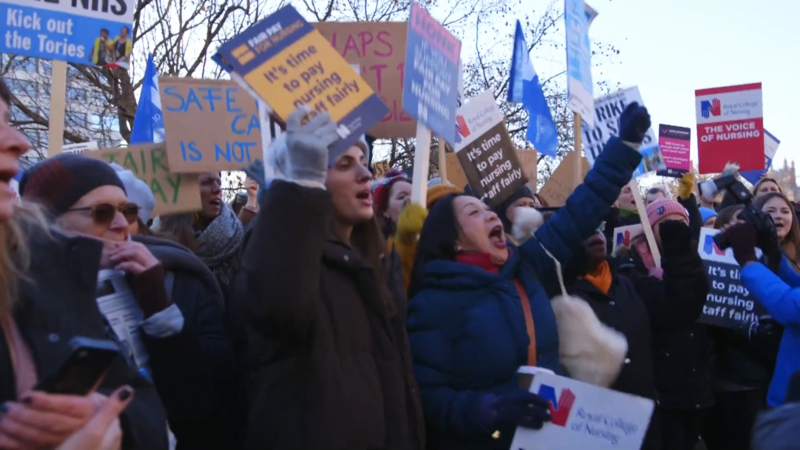The British government has introduced its legislation this week that will aim to curb strikes at a time of major industrial disputes. The legislation will require key public services to maintain a minimum level of service during strikes by unions.
On Tuesday, the government unveiled its legislation that will curb strikes, requiring key public services to maintain minimum service levels amidst ongoing strikes. Under the new legislation, the government intends to consult on maintaining minimum safety levels for fire, ambulance, and rail services. Other key public services include health, education, nuclear decommissioning, and border security.
“The British people need to know that when they have a heart attack, a stroke, or a serious injury, that an ambulance will turn up and that if they need hospital care, they have access to it,” business minister Grant Shapps told parliament. “I’m introducing a bill that will give government power to ensure the vital public services will have to maintain a basic function by delivering minimum safety levels ensuring that lives and livelihoods are not lost.”
The legislation comes at a time when the United Kingdom is facing a surge of industrial action being taken as pay increases still fall short of keeping up with a 40-year high inflation rate. Nurses, ambulance drivers, and rail workers are among those who have staged a walkout. Talks between key sectors and ministers took place on Monday but failed to make a breakthrough that would prevent future strikes.
The new bill angered trade unions, arguing the evidence from other countries only showed that such bills would lead trade unions to resort to other tactics and prolong disputes. Trade union umbrella group, the Trade Unions Congress, described the legislation as undemocratic and unworkable.
Meanwhile, British ministers are set to hold a political and business meeting with leaders in Northern Ireland on Wednesday. The meeting will surround post-Brexit trade issues as part of the efforts to come to a resolution with the European Union over the trade agreement amidst long-stalled talks between the UK and the EU.
By Monday, both the UK and the EU reached an agreement moving forward to address one point of concern.



 Dominican Republic Unveils Massive Rare Earth Deposits to Boost High-Tech and Energy Sectors
Dominican Republic Unveils Massive Rare Earth Deposits to Boost High-Tech and Energy Sectors  Trump Warns Iran as Gulf Conflict Disrupts Oil Markets and Global Trade
Trump Warns Iran as Gulf Conflict Disrupts Oil Markets and Global Trade  Argentina Senate Approves Bill to Lower Age of Criminal Responsibility to 14
Argentina Senate Approves Bill to Lower Age of Criminal Responsibility to 14  Trump to Address Nation as U.S. Launches Strikes in Iran, Axios Reports
Trump to Address Nation as U.S. Launches Strikes in Iran, Axios Reports  HHS Adds New Members to Vaccine Advisory Panel Amid Legal and Market Uncertainty
HHS Adds New Members to Vaccine Advisory Panel Amid Legal and Market Uncertainty  Trump Floats Ted Cruz for Future U.S. Supreme Court Nomination
Trump Floats Ted Cruz for Future U.S. Supreme Court Nomination  Israel Launches Fresh Strikes on Iran After Death of Supreme Leader Ayatollah Khamenei
Israel Launches Fresh Strikes on Iran After Death of Supreme Leader Ayatollah Khamenei  Pakistan-Afghanistan Tensions Escalate as Taliban Offer Talks After Airstrikes
Pakistan-Afghanistan Tensions Escalate as Taliban Offer Talks After Airstrikes  Israel Declares State of Emergency as Iran Launches Missile Attacks
Israel Declares State of Emergency as Iran Launches Missile Attacks  NYC Mayor Zohran Mamdani Meets President Trump to Tackle Housing Crisis and ICE Detentions
NYC Mayor Zohran Mamdani Meets President Trump to Tackle Housing Crisis and ICE Detentions  Macron Urges Emergency UN Security Council Meeting as US-Israel Strikes on Iran Escalate Middle East Tensions
Macron Urges Emergency UN Security Council Meeting as US-Israel Strikes on Iran Escalate Middle East Tensions  Netanyahu Suggests Iran’s Supreme Leader Khamenei May Have Been Killed in Israeli-U.S. Strikes
Netanyahu Suggests Iran’s Supreme Leader Khamenei May Have Been Killed in Israeli-U.S. Strikes  Philippines, U.S., and Japan Conduct Joint Naval Drills in South China Sea to Boost Maritime Security
Philippines, U.S., and Japan Conduct Joint Naval Drills in South China Sea to Boost Maritime Security  Trump Orders Federal Agencies to Halt Use of Anthropic AI Technology
Trump Orders Federal Agencies to Halt Use of Anthropic AI Technology  U.S.-Iran Nuclear Talks Show Progress but No Breakthrough Amid Rising Military Tensions
U.S.-Iran Nuclear Talks Show Progress but No Breakthrough Amid Rising Military Tensions  USITC to Review Impact of Revoking China’s PNTR Status, Potentially Raising Tariffs on Chinese Imports
USITC to Review Impact of Revoking China’s PNTR Status, Potentially Raising Tariffs on Chinese Imports  Russia Signals Openness to U.S. Security Guarantees for Ukraine at Geneva Peace Talks
Russia Signals Openness to U.S. Security Guarantees for Ukraine at Geneva Peace Talks 































